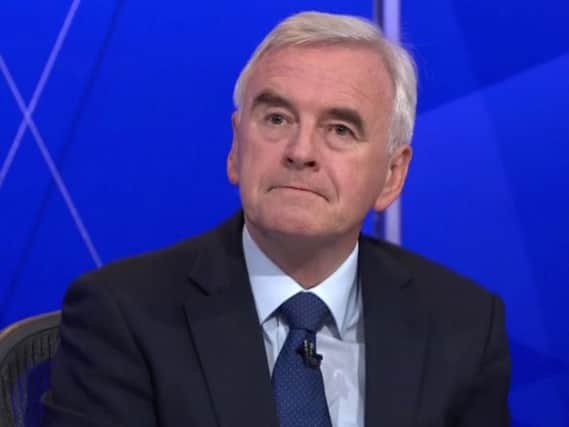Labour unveil plans for national investment bank
This article contains affiliate links. We may earn a small commission on items purchased through this article, but that does not affect our editorial judgement.


Mr McDonnell was telling the party’s conference in Liverpool that Labour will offer an “interventionist government” ready to protect key home-grown businesses against global market pressures.
He will accuse the Conservative Government of failing to act swiftly to defend the steel industry from cheap imports and undermining Britain’s industrial potential by cutting investment in scientific research and subsidies for renewable energy.
Advertisement
Hide AdAdvertisement
Hide AdSpeaking to Sky News’s Sunrise, Mr McDonnell said: “We are setting up a national investment bank. We are putting into that bank £100 billion. Yes, that will be borrowed, but it will be borrowed at the cheapest rates in our history.
“That will lever in, at the average leverage rate, another £150 billion. And we will use that to invest in our infrastructure, in our skills and we will be working with entrepreneurs.
“We want to be what is described in modern terminology as an entrepreneurial state, where the state will work with the private sector, the wealth creators, to develop the products and the markets, and we will invest in the long term.
“That’s happening right the way across Europe now. We are behind our competitors on this.”
Mr McDonnell denied the move would mean higher taxes, comparing it to the Bank of England’s recent injection of £70 billion into the economy through quantitative easing.
“Short term interventions like that do pay dividends pretty quickly,” he said. “We think we can get growth growing very quickly in this economy and it will then pay for itself.
“So in the short term, yes there will be some increased costs, but borrowing at the moment is extremely low-cost.”
In his keynote speech at the four-day conference, Mr McDonnell will say that the rules of globalisation “are being rewritten for us”, with governments around the world moving away from reliance on free markets in favour of intervention.
Advertisement
Hide AdAdvertisement
Hide AdHe will say: “We need a new deal across our whole economy. Because whatever we do in Britain, the old rules of the global economy are being rewritten for us.
“The winds of globalisation are blowing in a different direction. They are blowing against the belief in the free market, and in favour of intervention.”
Conservatives were “too blinkered by their ideology” to recognise the international shift away from free market policies, he will claim.
He will promise: “Be certain the next Labour government will be an interventionist government.
“We will not stand by like this one has and see our key industries flounder and our future prosperity put at risk... When we return to government we will implement a comprehensive industrial strategy.”
Mr McDonnell will add: “After Brexit, we want to see a renaissance in British manufacturing.
“And as we’ve committed ourselves, our government will create an entrepreneurial state that works with the wealth creators, the workers and the entrepreneurs to create the products and the markets that will secure our long-term prosperity.”
Britain is well placed to take advantage of developments in digital technology which allow companies to site manufacturing facilities close to skilled workforces and potential markets, rather than in the part of the world able to offer the cheapest labour, the shadow chancellor will argue.
Advertisement
Hide AdAdvertisement
Hide AdThis meant that the tide of factory closures as firms shifted work overseas is now turning, with one in six manufacturers in Britain now bringing jobs back to Britain.
“Digital technology means production can be smaller-scale, in smaller, faster firms dependent on co-operation and collaboration, not dog-eat-dog competition,” Mr McDonnell will say.
“The economies that are making best use of this shift are those with governments that understand it is taking place, and support their new industries and small businesses.
“We could be a part of that change here.”
Britain needs to capitalise on its heritage of scientific research and engineering expertise, natural resources which could make it a world-leader in renewables, and the talent and ambition available in all parts of the country, he will say.
•
DOWNLOAD THE SCOTSMAN APP ON ITUNES OR GOOGLE PLAY